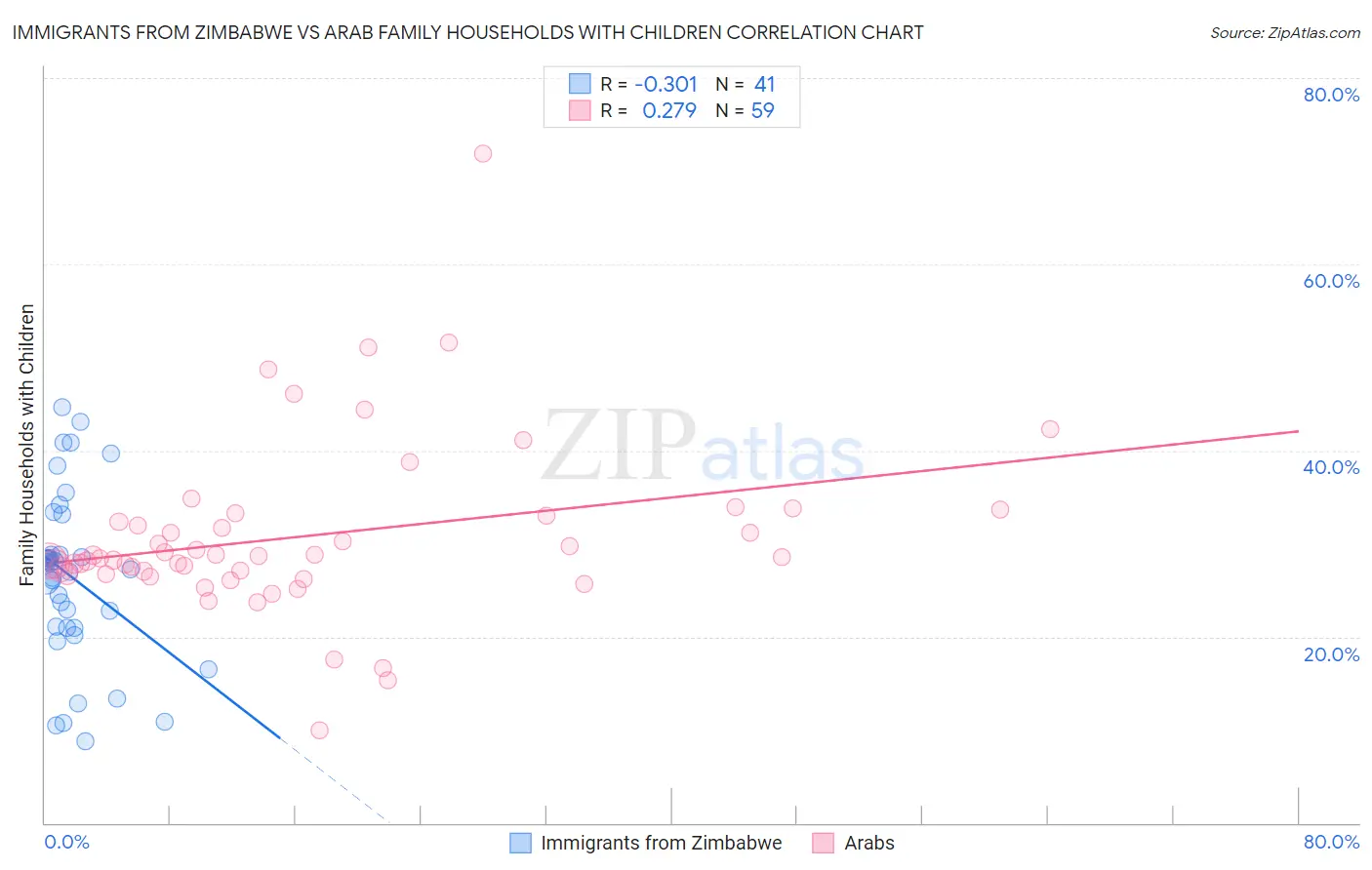Immigrants from Zimbabwe vs Arab Family Households with Children
COMPARE
Immigrants from Zimbabwe
Arab
Family Households with Children
Family Households with Children Comparison
Immigrants from Zimbabwe
Arabs
27.8%
FAMILY HOUSEHOLDS WITH CHILDREN
92.8/ 100
METRIC RATING
122nd/ 347
METRIC RANK
28.0%
FAMILY HOUSEHOLDS WITH CHILDREN
97.0/ 100
METRIC RATING
113th/ 347
METRIC RANK
Immigrants from Zimbabwe vs Arab Family Households with Children Correlation Chart
The statistical analysis conducted on geographies consisting of 117,786,301 people shows a mild negative correlation between the proportion of Immigrants from Zimbabwe and percentage of family households with children in the United States with a correlation coefficient (R) of -0.301 and weighted average of 27.8%. Similarly, the statistical analysis conducted on geographies consisting of 486,135,019 people shows a weak positive correlation between the proportion of Arabs and percentage of family households with children in the United States with a correlation coefficient (R) of 0.279 and weighted average of 28.0%, a difference of 0.50%.

Family Households with Children Correlation Summary
| Measurement | Immigrants from Zimbabwe | Arab |
| Minimum | 8.8% | 10.0% |
| Maximum | 44.7% | 71.9% |
| Range | 35.9% | 61.9% |
| Mean | 26.3% | 30.8% |
| Median | 27.3% | 28.6% |
| Interquartile 25% (IQ1) | 20.9% | 26.7% |
| Interquartile 75% (IQ3) | 31.0% | 33.0% |
| Interquartile Range (IQR) | 10.1% | 6.2% |
| Standard Deviation (Sample) | 9.1% | 9.4% |
| Standard Deviation (Population) | 9.0% | 9.4% |
Demographics Similar to Immigrants from Zimbabwe and Arabs by Family Households with Children
In terms of family households with children, the demographic groups most similar to Immigrants from Zimbabwe are Immigrants from Western Asia (27.9%, a difference of 0.070%), Immigrants from Northern Africa (27.8%, a difference of 0.070%), Immigrants from Singapore (27.8%, a difference of 0.14%), Ecuadorian (27.8%, a difference of 0.14%), and Immigrants from Ethiopia (27.8%, a difference of 0.16%). Similarly, the demographic groups most similar to Arabs are Immigrants from Middle Africa (28.0%, a difference of 0.010%), South American Indian (28.0%, a difference of 0.020%), Scandinavian (28.0%, a difference of 0.030%), Immigrants from Africa (28.0%, a difference of 0.030%), and Spaniard (28.0%, a difference of 0.10%).
| Demographics | Rating | Rank | Family Households with Children |
| Immigrants | Uganda | 97.7 /100 | #107 | Exceptional 28.0% |
| Immigrants | Burma/Myanmar | 97.7 /100 | #108 | Exceptional 28.0% |
| Tohono O'odham | 97.6 /100 | #109 | Exceptional 28.0% |
| Spaniards | 97.4 /100 | #110 | Exceptional 28.0% |
| Scandinavians | 97.1 /100 | #111 | Exceptional 28.0% |
| Immigrants | Middle Africa | 97.0 /100 | #112 | Exceptional 28.0% |
| Arabs | 97.0 /100 | #113 | Exceptional 28.0% |
| South American Indians | 96.9 /100 | #114 | Exceptional 28.0% |
| Immigrants | Africa | 96.8 /100 | #115 | Exceptional 28.0% |
| Pakistanis | 96.0 /100 | #116 | Exceptional 27.9% |
| Immigrants | Malaysia | 95.9 /100 | #117 | Exceptional 27.9% |
| Central American Indians | 95.9 /100 | #118 | Exceptional 27.9% |
| Zimbabweans | 95.6 /100 | #119 | Exceptional 27.9% |
| Europeans | 95.4 /100 | #120 | Exceptional 27.9% |
| Immigrants | Western Asia | 93.6 /100 | #121 | Exceptional 27.9% |
| Immigrants | Zimbabwe | 92.8 /100 | #122 | Exceptional 27.8% |
| Immigrants | Northern Africa | 91.8 /100 | #123 | Exceptional 27.8% |
| Immigrants | Singapore | 90.8 /100 | #124 | Exceptional 27.8% |
| Ecuadorians | 90.8 /100 | #125 | Exceptional 27.8% |
| Immigrants | Ethiopia | 90.5 /100 | #126 | Exceptional 27.8% |
| Belizeans | 90.0 /100 | #127 | Exceptional 27.8% |